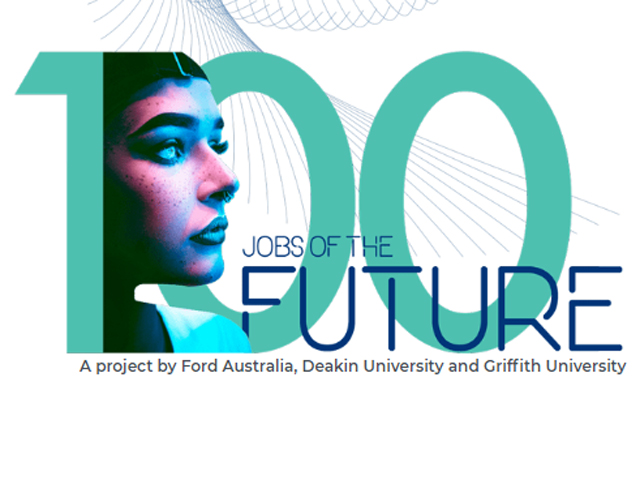100 Jobs of the Future

Ford Australia, in partnership with Deakin University and Griffith University, released 100 Jobs of the Future – a new report and online quiz to help Australians explore the future of work. Experts across industry and academia interviewed for the report predict that jobs of the future will include Autonomous Vehicle Designer, Cyborg Psychologist, Space Tourism Operator, and Robot Ethicist.
Predicting the future of work
The 100 Jobs of the Future report offers a diverse sample of potential jobs, including titles, descriptions and skills required, across numerous sectors. The report was developed through comprehensive analysis of existing literature on work futures, as well as in-depth interviews with experts representing industries critical to future work: health, agriculture, engineering and materials science, transport and mobility, computing and artificial intelligence, commerce, and education.
"With a boom in emerging industries and new technologies such as robotics, biotechnology and artificial intelligence, many of the jobs today's younger generation will do don't even exist yet," said Peta White, Lecturer, Science, Technology and Environmental Education, Deakin University. "Our aim with this project is to help parents, educators and industry professionals support the next generation in their future career ambitions," White added.
Jobs across all categories are influenced by several major drivers of change: technological advances, climate change, data democratisation, globalisation, population pressures and changed demographic profiles. Roles are clustered into 11 broad categories:
• Technology
• People
• Law
• Business
• Environment
• Urban
• Agriculture
• Health
• Data
• Experience
• Space
The report reveals creative intelligence, social intelligence, manual dexterity, problem solving, creativity, entrepreneurial and interpersonal skills as essential for the future.
"People will need to work with machines in new ways, rather than compete with them for jobs – this will be the way to keep pace with the changing economy," said Russell Tytler, Professor and Chair of Science Education, Deakin University.
Building a pipeline of Australian talent
Education is a critical factor in determining individual and community prosperity in a global knowledge economy.
Ford Driver Assistance Technologies (DAT) engineer, Louise Nance, said her career exemplifies the opportunities that will be available for the workforce of the future.
"When I started as a graduate four years ago, my job didn't exist. I hope this report will inspire and support youth to find fulfilling, rewarding careers, and ensure a pipeline of talent for Aussie innovation," Nance said.
With Australia's changing economy and business landscape, the importance of cross-disciplinary skills was a common theme in the 100 Jobs of the Future report, with collaboration and practical problem solving featuring among many predicted roles. Both of these skills are central to STEAM education.
"Our business is transforming – with connected cars, autonomous vehicles and new ridesharing models on the horizon," Nance added.
"There's an exciting future ahead for those who want to challenge existing systems and reshape the way we will all move around," added Max Wolff, Design Director for Ford Asia Pacific.
Finding your job of the future
"Through our research for the 100 Jobs of the Future report, we predict a more complex and changing world of work, but one where young people will be able to find or create exciting work opportunities that make the most of their interests and skills," said Ruth Bridgstock, Professor and Deputy Director of Teaching and Curriculum Transformation at Griffith University.
Future workers will have many jobs over a lifetime, and people who can adapt and stay ahead of the needs of the workplace will prosper. The capacity to learn, and to be strategic about learning, will increasingly become the key to success.
The 100 Jobs of the Future report, future jobs quiz and educational resources can be found at: https://100jobsofthefuture.com.
MORE





